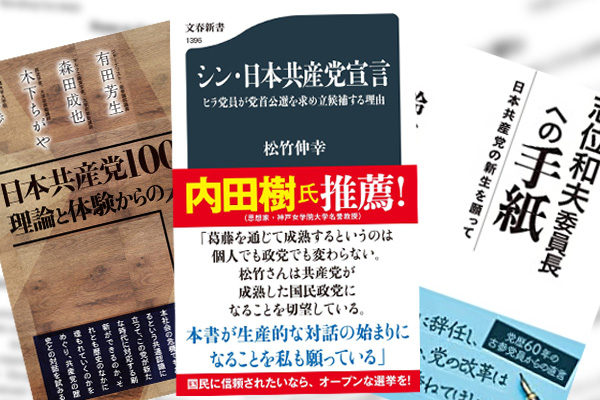The Japanese Communist Party is shaking at an estimated intensity of 3 or 4 in the Japanese seismic scale of 0-7. We cannot take our eyes off the JCP plagued with aftershocks. The party expelled Nobuyuki Matsutake on February 6 who called for choosing its leader through direct vote by its members. Matsutake is a journalist and a former head of foreign policy and defense section of the JCP’s policy committee. Even the Asahi and Mainichi newspapers, known for their left-leaning tendencies, criticized the JCP disciplinary action in their editorials as excessive.
Still clinging to “democratic centralism”
A fight was picked by party members or sympasizers who published their books aiming at achieving a popular election system for its leader. Matsutake has authored “Shin Nihon Kyosanto Sengen (New Manifesto of JCP).” The other two books are “Shii Kazuo Iincho eno Tegami (Letter to Chairman Kazuo Shii)” by Hajime Suzuki and “Nihon Kyosanto 100-nen: Riron to Taiken karano Bunseki (100 years of JCP: Analysis from Theory and Experience)” by Yoshifu Arita and others.
The JCP seems filled with internal complaints. The party suffered a series of setbacks in a general election in 2021 and in a House of Councilors election in 2022. The number of JCP members and the circulation of the party’s organ paper “Akahata (red flag)” have halved from peaks around 1980. Party members have aged. Activists who rallied against the revision of Japan-U.S. Security Treaty in 1960 and led student protests in the 1970s might have been tired. Socialist dreams and romanticism are obviously ending up as an illusion. Nevertheless, the JCP has left its leader unchanged for 23 years since 2000 despite consecutive election defeats. At the JCP, unlike other political parties, none takes responsibility for election setbacks. This may be the reason for the popular leader election proposal.
The JCP rebutted the proposal on the Akahata last August 24. It claimed that the popular leader election system would lead to the party’s division into factions or its breakup, running counter to the “democratic centralism” and iron rules of the revolutionary party. Oddly, the rebuttal cited the word “revolutionary party” three times. The party might not have given up on a revolution.
Following the 1989 Berlin Wall fall and the 1991 Soviet Union breakup, most communist parties in Western Europe including France and Italy virtually fell apart. They first abandoned the democratic centralism and then admitted their receipt of financial support from the Soviet Union over a long period However, the JCP has retained the democratic centralism and still denies any receipt of financial support.
The JCP now shamelessly claims the democratic centralism as the rule it has created through its own experiences. Good Lord! Following the Russian revolution, the Soviet Communist Party launched the Comintern (Communist International or International Communist Party) in 1919 aiming at world communization. In the next year, it came up with the 21 commandments to establish hard-core revolutionary parties in foreign countries. Commandment 12 called for the democratic centralism, requiring revolutionary parties to have top-down, military-like discipline. Opponents to the rule would face periodic purge under Commandment 13. Under the iron rule, the JCP was born in 1922.
Deadly poison to perish people
Attention must be paid to the fact that this rule is stipulated in the national constitutions in such communist countries as China, Vietnam, Laos and North Korea. The party rule has been transformed into the national rule. This is a horrible story. The rule has been embodied in China as a country of mass surveillance.
The democratic centralism amounts to a deadly poison and the enemy of a free society. The JCP still retains the poison. If a JCP-led government is born in Japan, the deadly poison will hit the people. Will the nation fall or the JCP fall by self-poisoning? The internal dispute of the JCP is a something to see.
Shohei Umezawa is Chairman of the Council of the Japan Institute for National Fundamentals and Professor Emeritus at Shobi Gakuen University.


